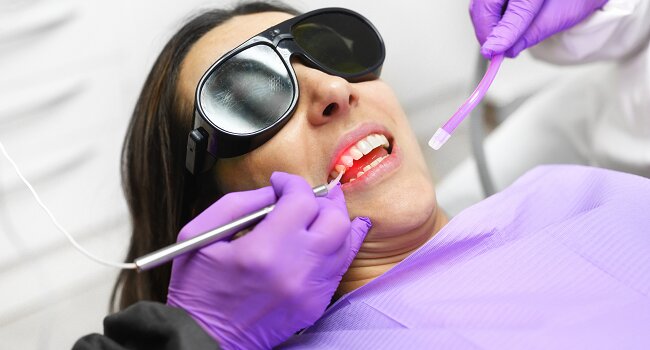In the dynamic landscape of dental care, 2024 brings forth five transformative trends poised to redefine the patient experience and the practice of dentistry. From cutting-edge technology and personalised treatment plans to the rise of tele-dentistry, the impact of biocompatible materials, and the seamless integration of artificial intelligence, the field is undergoing a profound metamorphosis. This article explores these key trends, presenting a narrative of innovation, precision, and accessibility that signals a new era in oral health.
Technological Advancements in Dentistry:
Recent breakthroughs in dental technology, such as digital radiography and 3D printing, are transforming diagnostics and treatment. Digital radiography provides clearer images with reduced radiation, enabling quick identification of issues. 3D printing allows for precise, custom dental prosthetics, enhancing aesthetic outcomes and decreasing turnaround time. To explore these advancements further, visit hillsdentalcentre.com.au, a leading provider of cutting-edge dental solutions.
Personalised Treatment Plans:
Generic, one-size-fits-all dental procedures are giving way to personalised treatment plans. Dentists now tailor their approaches to each patient, factoring in unique oral health needs, goals, and preferences. This shift ensures more effective and efficient treatments, ultimately promoting long-term oral health.
Tele-dentistry: Revolutionising Remote Dental Care:
The rise of tele-dentistry, leveraging video conferences and digital imaging, is reshaping how dental care is delivered. Overcoming geographical barriers, it enables remote consultations and treatments, proving especially valuable in remote areas. Its accessibility has proven crucial during public health crises, reducing the need for in-person visits.
Biocompatible Materials: Transforming Dentistry:
Biocompatible materials are revolutionising dentistry by interacting harmoniously with the oral environment. These materials reduce the risk of adverse reactions, promoting better oral health outcomes. Their durability and resistance to corrosion ensure long-lasting restorations, offering a reliable solution that aligns with modern dental care expectations.
Integration of Artificial Intelligence in Dental Practices:
The integration of artificial intelligence (AI) in dental practices has revolutionised the field and improved patient outcomes. AI algorithms are being utilised to enhance diagnostic accuracy, treatment planning, and patient management. In the realm of diagnostics, AI technology has the ability to analyze radiographs and scans with incredible precision, allowing for the early detection of dental conditions such as cavities, gum disease, and oral cancer. This early detection not only improves patient prognosis but also enables dentists to intervene at an earlier stage, reducing the need for invasive and extensive treatments.
Furthermore, AI-powered treatment planning has significantly enhanced the customisation and personalisation of dental care. By analysing patient data, including their dental history, diagnostic results, and medical profile, AI algorithms can generate personalized treatment plans that are tailored to each individual’s unique needs. This enables dentists to provide more accurate and targeted treatments, leading to better treatment outcomes and improved patient satisfaction.

The landscape of dental care in 2024 is defined by these five pivotal trends – technological advancements, personalised treatment plans, tele-dentistry, biocompatible materials, and the integration of artificial intelligence. These trends collectively contribute to a more efficient, effective, and patient-centric approach to oral health.
What advancements have been made in dental technology?
In recent years, there have been significant advancements in dental technology, such as the use of digital imaging, laser dentistry, and CAD/CAM technology for creating precise dental restorations.
How do personalise treatment plans benefit dental patients?
Personalised treatment plans take into account an individual’s unique genetic makeup and oral health needs. This tailored approach helps to ensure more effective and targeted dental care, resulting in improved treatment outcomes.
What is tele-dentistry and how is it changing dental care?
Tele-dentistry involves the use of technology to provide dental care remotely. This allows patients to receive consultations, advice, and even certain dental treatments from the comfort of their own homes, making dental care more convenient and accessible.
How are biocompatible materials changing the field of dentistry?
Biocompatible materials are designed to be compatible with the human body, reducing the risk of adverse reactions or allergies. Their use in dentistry allows for more natural-looking and long-lasting dental restorations, improving both the aesthetics and functionality of the patient’s teeth.
How is artificial intelligence being integrated into dental practices?
Artificial intelligence is being used in various ways in dentistry, such as automating administrative tasks, analysing patient data for personalised treatment plans, and aiding in the diagnosis of dental conditions. This integration enhances efficiency and accuracy in dental practices.
What is the significance of the shift towards minimally invasive procedures in dentistry?
Minimally invasive procedures involve less cutting or removal of healthy tooth structure, preserving more of the natural tooth. This shift reduces patient discomfort, promotes faster healing, and allows for more conservative treatments.
How does preventive dentistry focus on oral health education?
Preventive dentistry emphasises the importance of regular dental check-ups, proper oral hygiene practices, and education on maintaining optimal oral health. By promoting preventive measures, dental professionals aim to prevent dental issues before they arise, saving patients from potentially costly and invasive treatments.
What role does genetics play in dental care?
Genetics can influence an individual’s susceptibility to certain dental conditions, such as tooth decay and gum disease. Understanding a patient’s genetic predispositions can help dentists develop personalized treatment plans and preventive strategies to address their specific oral health needs.


















